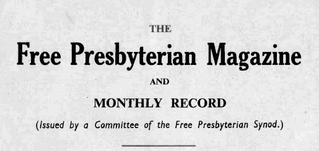Romans 8
|
Roman 8:1-2:
Therefore, there is now no condemnation for those who are in Christ Jesus, because through Christ Jesus the law of the Spirit who gives life has set you free from the law of sin and death. |

This is a summary of the letter so far. ‘Now’ refers not to individual conversion or some supposed change of gear into the higher Christian life, but to the gospel events which have brought into the open (1:17 ‘revealed’; 3:21 ‘made known’) the justification by faith by which believers of every age have been rescued from condemnation.
‘Therefore’ refers back generally to the argument so far, but very specifically to 5:12-21. Paul uses this word ‘condemnation’ only here and in 5:16, 18 in all his letters. It is the opposite of ‘justification’ (5:16). The words ‘through Jesus Christ our Lord’ (7:25) and ‘in Christ Jesus’ (8:1) tie us back to Paul’s exposition of life in union with Christ in 5:12-21 (developed in 6:1-11). (SOURCE: Olive Tree Blog) |
 David Feddes
David Feddes
Watchman Nee, a Chinese Christian leader from an earlier generation, told of a man in deep water who wasn’t able to swim. However, there was an expert swimmer nearby. As Nee watched, he expected this man to rescue the other one immediately. But he did nothing. “Don’t you see he’s drowning?” shouted Nee. But still the good swimmer did nothing. Meanwhile, the drowning man grew weaker and fainter. Nee thought to himself, “How awful that this great swimmer won’t rescue a drowning brother.” But just as the drowning man ran out of energy and stopped thrashing around, the swimmer sped to him in a few swift strokes, took hold of him, and brought him safely to shore. Nee scolded the swimmer for waiting so long, but the man replied, “Any earlier, and he would have pulled me under with him. A drowning man cannot be rescued until he is utterly exhausted and stops trying to save himself.” So too, when you and I are drowning in sin, the Lord may let us thrash around for awhile, trying desperately to save ourselves and change our ways. Of course God is not worried that we could pull him under, but he knows that before we are rescued, we must first give up any hope of earning the right to heaven or making ourselves holy on our own. God’s holy law leaves us exhausted and helpless before the face of God. If our only hope of holiness and heaven were our ability to do the good things commanded in God’s law, we would be ruined. But just when we give up and cry, “Who will deliver me?” we may find ourselves saying, “Thanks be to God—through Jesus Christ our Lord! Therefore there is now no condemnation for those who are in Christ Jesus, because through Christ Jesus the law of the Spirit of life set me free from the law of sin and death” (Romans 8:1-2). --David Feddes; Fighting the Flesh
 Billy Graham
Billy Graham
"The strength for our conquering and victory is drawn continually from Christ. The Bible does not teach that sin is completely eradicated from the Christian in this life, but it does teach that sin shall no longer reign over you. The Strength and power of sin have been broken. The Christian now has the resources available to live above and beyond this world. It is like the little girl who said that when the devil came knocking with a temptation, she just sent Jesus to the door."– Billy Graham
 Ed Jarrett
Ed Jarrett
"The good news of no condemnation is not applicable to all people. And not even to all church-going people. As Paul makes clear at the beginning, it is those who are in Christ who have no condemnation. And, at the end of this passage, he separates those who live according to the Spirit from those who live according to the flesh. The righteous requirements of the law are met only in those who live according to the Spirit.
--Ed Jarrett: A Clay Jar; No Condemnation for Those in Christ Jesus 4.24.22
--Ed Jarrett: A Clay Jar; No Condemnation for Those in Christ Jesus 4.24.22
The good news of no condemnation is not applicable to all people. And not even to all church-going people. As Paul makes clear at the beginning, it is those who are in Christ who have no condemnation. And, at the end of this passage, he separates those who live according to the Spirit from those who live according to the flesh. The righteous requirements of the law are met only in those who live according to the Spirit. --A Clay Jar

The gospel, Paul says, is God’s solution to this problem. But it is not a solution based on law. No, if God were bound by law and order, we would all be lost. For all have sinned and fallen short of the glory of God (Rom. 3:23). No one is innocent, not even one (Rom. 3:10). We have all violated God’s law.
And yet God issues a surprising verdict: “There is now no condemnation for those who are in Christ” (Rom. 8:1). Through the gospel, the true shape of God’s justice has been revealed—a justice based not on law but rather on faith (Rom. 3:21–22). God declares innocent all who put their faith in Christ.
Paul knows that some think God is soft on crime. “How do sinners keep getting away with it?” they ask. “Why has God not yet punished them?” But the answer is not, Paul writes, that God is indifferent to evil. No, God is indeed a just judge (Rom. 3:26). It’s rather that God’s solution to sin is an unexpected one. Where we look for law and punishment, God addresses the problem of evil through Jesus’ reconciling sacrifice (Rom. 3:24–25). --Ryan Schellenberg
And yet God issues a surprising verdict: “There is now no condemnation for those who are in Christ” (Rom. 8:1). Through the gospel, the true shape of God’s justice has been revealed—a justice based not on law but rather on faith (Rom. 3:21–22). God declares innocent all who put their faith in Christ.
Paul knows that some think God is soft on crime. “How do sinners keep getting away with it?” they ask. “Why has God not yet punished them?” But the answer is not, Paul writes, that God is indifferent to evil. No, God is indeed a just judge (Rom. 3:26). It’s rather that God’s solution to sin is an unexpected one. Where we look for law and punishment, God addresses the problem of evil through Jesus’ reconciling sacrifice (Rom. 3:24–25). --Ryan Schellenberg

1. If God waited until people were without sin to use them, then He’d never get to use anyone, because we all are actively sinning in some proportion.
2. Don’t we do the same? We use electricity even though we don’t understand how it works. We don’t know all the inner workings of the car’s motor before we drive it. We do many things without perfect knowledge of them.
3. Everybody in the world – even the most saintly -- live in a state of sin. The Bible says “There’s none righteous, no, not one” Rom. 3:10. The apostle John said, "If we say we have no sin, we lie and the truth is not in us" (1:8, KJV). James says, "We all stumble in many ways" (3:2, NIV).
4. The wonder of wonders is that though we live in a constant state of corruption and fallen nature, God can and does work in the midst of it.
5. All through the Scripture, God used people in their weakness. It wasn't that they had the strength; all they had was faith in God. God supplied what they did not have. --John Gaston
2. Don’t we do the same? We use electricity even though we don’t understand how it works. We don’t know all the inner workings of the car’s motor before we drive it. We do many things without perfect knowledge of them.
3. Everybody in the world – even the most saintly -- live in a state of sin. The Bible says “There’s none righteous, no, not one” Rom. 3:10. The apostle John said, "If we say we have no sin, we lie and the truth is not in us" (1:8, KJV). James says, "We all stumble in many ways" (3:2, NIV).
4. The wonder of wonders is that though we live in a constant state of corruption and fallen nature, God can and does work in the midst of it.
5. All through the Scripture, God used people in their weakness. It wasn't that they had the strength; all they had was faith in God. God supplied what they did not have. --John Gaston
|
Romans 8:3:
For what the law could not do in that it was weak through the flesh, God did by sending His own Son in the likeness of sinful flesh, on account of sin: He condemned sin in the flesh, |
What was impossible for the law, God did by sending His Son as an offering for sin; He condemned sin in the flesh. (Romans 8:3.) God’s judgment over sin in our members has now been fulfilled in Christ Jesus. The kingdom of heaven is now within us, and the Spirit of Christ will, through our obedience, open a way to previously unknown areas in our body—namely, to those places where the law of sin and death is active. As God’s Spirit progresses through the water and the blood (the death of Christ in our flesh), He is able to gradually destroy the law of sin and death. He can do this because the law the Spirit possesses makes our human spirit—which formerly was bound by the law of sin and death—alive. The law of sin and the law of death are two distinct laws, and they each work in their own way. The law of sin constantly forces its demands upon our consciousness. If we yield to these demands, the law of sin will lead its prey into the law of death. As long as the law of sin rules a person—before he has been given over to the law of death—the conscience is awake, and the Spirit convicts that person of sin. However, by sinning again and again, the law of death silences the conscience, and the person sins with no sense of guilt. The law of sin leads the ungodly further into unknown territory. The person sins there, and the law of death continues to work to destroy the conscience so that, in the end, the person becomes dead in trespasses and sins. The law of the Spirit works in the opposite way. It casts its light on the sin a person has previously committed without getting a bad conscience. It takes sin from the iron hand of the law of death and brings it into the light of the conscience. We agree with God’s Spirit, judge the sin and cease from it. (Galatians 5:16-18; 1 Peter 4:1.) The next time a new sin is brought before our consciousness, it also receives its judgment, and the process continues. In this way we are made alive. This is a gradual process and cannot—unlike the forgiveness of sins—take place in a moment. Life is serious. We ourselves determine our own salvation or condemnation. God has established laws for everything, and He does not depart from them, because He is no respecter of persons. -Stiftelsen Skjulte Skatters Forlag 1912 |
 Johann Gerhard
Johann Gerhard
Now, the purpose of teaching that it is impossible to fulfill the Law is not to encourage or excuse carelessness, sloth, and intentional negligence...rather, it is so that
(1) we, confessing the powerlessness of our abilities and the imperfection of our own righteousness, may flee for refuge to Christ, “who has redeemed us from the curse of the Law, having been made a curse for us” (Gal. 3:13); “through [Him] God has done what was impossible for the Law” (Rom. 8:3), “that He might be the end of the Law for righteousness for all who believe” (Rom. 10:4). The glory of having perfect righteousness must be reserved for Christ alone, who is “holy, blameless, unstained, separated from sinners” (Heb. 7:26). Those who ignore and reject His righteousness “seeking to establish their own, are not under the righteousness of God” (Rom. 10:3). Therefore the first use of this teaching lies in the article of justification, namely, that we not set before God’s judgment our imperfect and variously stained obedience to the Law but that we may learn that we are justified by faith in Christ.
(2) The second use of this teaching lies in the article on good works, that we may learn that by the natural powers of our own free choice we cannot begin the sincere and true obedience we owe the Law, but the Law of God “must be written on our hearts” through the Holy Spirit (Jer. 31:33), so that we may begin to show not merely an external obedience but also an inner one with a spontaneous spirit and from the heart. On the other hand, because this inchoate obedience is still very far from the perfection the Law requires, we cannot boast about it before the judgment of God but are forced to confess that “all our righteousnesses are as menstrual rags” (Isa. 64:6) and that, “when we have done everything, we are still but unworthy servants” (Luke 17:10).
(3) Lastly, it serves to teach us that the inchoate obedience of the regenerate is pleasing to God, not because it satisfies the law perfectly but because it proceeds from faith in Christ; through such faith its imperfection and remaining fault is covered.
-Johann Gerhard; Excerpt from On the Law (pre-publication), Concordia Publishing House 2015. All rights reserved. Used with permission of Concordia Publishing House. www.cph.org.
(1) we, confessing the powerlessness of our abilities and the imperfection of our own righteousness, may flee for refuge to Christ, “who has redeemed us from the curse of the Law, having been made a curse for us” (Gal. 3:13); “through [Him] God has done what was impossible for the Law” (Rom. 8:3), “that He might be the end of the Law for righteousness for all who believe” (Rom. 10:4). The glory of having perfect righteousness must be reserved for Christ alone, who is “holy, blameless, unstained, separated from sinners” (Heb. 7:26). Those who ignore and reject His righteousness “seeking to establish their own, are not under the righteousness of God” (Rom. 10:3). Therefore the first use of this teaching lies in the article of justification, namely, that we not set before God’s judgment our imperfect and variously stained obedience to the Law but that we may learn that we are justified by faith in Christ.
(2) The second use of this teaching lies in the article on good works, that we may learn that by the natural powers of our own free choice we cannot begin the sincere and true obedience we owe the Law, but the Law of God “must be written on our hearts” through the Holy Spirit (Jer. 31:33), so that we may begin to show not merely an external obedience but also an inner one with a spontaneous spirit and from the heart. On the other hand, because this inchoate obedience is still very far from the perfection the Law requires, we cannot boast about it before the judgment of God but are forced to confess that “all our righteousnesses are as menstrual rags” (Isa. 64:6) and that, “when we have done everything, we are still but unworthy servants” (Luke 17:10).
(3) Lastly, it serves to teach us that the inchoate obedience of the regenerate is pleasing to God, not because it satisfies the law perfectly but because it proceeds from faith in Christ; through such faith its imperfection and remaining fault is covered.
-Johann Gerhard; Excerpt from On the Law (pre-publication), Concordia Publishing House 2015. All rights reserved. Used with permission of Concordia Publishing House. www.cph.org.
|
Romans 8:4:
in order that the righteous requirements of the law might be fully met in us, who do not live according to the sinful nature but according to the Spirit. |
To disobey God is to invite the curse, and the curse on sacrilege is especially severe. A time of judgment is also a time of redemption, in that it delivers the covenant-keepers from the ungodly and enhances their blessing. |
| God is not in all his thoughts and there is no fear of God before his eyes. All these things the Scriptures assert. Sin has stripped man of every vestige of desire and ability to seek, in any degree, the praise and honour of his Creator, and at heart he is full to overflowing with enmity and rebellion against the revealed Name and declared will of Him that is Most High. “The carnal mind is enmity against God” (Rom 8:7); and this is all exposed as man is portrayed in the Scriptures of the Old and New Testaments, and as his conduct is viewed from one generation to another in the light of these same Scriptures. By his wicked works, innumerable and diverse as they are, the godless, immoral and unspiritual condition of his heart is discovered and made manifest. As the Lord Jesus declares, “For out of the heart proceed evil thoughts, murders, adulteries, fornications, thefts, false witness, blasphemies” (Matt 15:19). And those who contend that there is any good thing in man, are still in spiritual darkness and “do greatly err, not knowing the Scriptures, nor the power of God.”
|

As was before observed, reconciliation and the pardon of sin through the blood of Christ do directly, in the first place, respect our relief from the state and condition whereinto we were cast by the sin of Adam, — in the loss of the favor of God, and liableness unto death. This, therefore, is that which principally, and in the first place, a lost convinced sinner, such as Christ calls unto himself, does look after. And therefore justification is eminently and frequently proposed as the effect of the blood-shedding and death of Christ, which are the direct cause of our reconciliation and pardon of sin. But yet from none of these considerations does it follow that the obedience of the one man, Christ Jesus, is not imputed unto us, whereby grace might reign through righteousness unto eternal life.
The same truth is fully asserted and confirmed, Romans 8:1-4. But this place has been of late so explained and so vindicated by another, in his learned and judicious exposition of it (namely, Dr. Jacomb), as that nothing remains of weight to be added unto what has been pleaded and argued by him, part 1 verse 4, p.587, and onwards. And indeed the answers which he subjoins (to the arguments whereby he confirms the truth) to the most usual and important objections against the imputation of the righteousness of Christ, are sufficient to give just satisfaction unto the minds of unprejudiced, unengaged persons. I shall therefore pass over this testimony, as that which has been so lately pleaded and vindicated, and not press the same things, it may be (as is not unusual) unto their disadvantage.
Thomas Jacomb: pp 576-77, The Righteousness of the Law Rom VIII Ver. IV
3. Thirdly, Others open it thus, the righteousness of the Law is fulfilled in Believers perfectly, yet not personally, but imputatively.
Their meaning is this, the Lord Jesus in his own person whilst he was here on earth did obey the Law, perfectly conforming to it in all its holy commands; now this his most perfect obedience to the Law made over, reckoned, imputed to his members, as if they themselves in their own persons had performed it. The Law’s righteousness is not fulfilled in them formally, subjectively, inherently or personally; but legally ( they being in Christ as their Head and Surety) and imputatively so it is. This is the fulfilling which suits with the words, for ’tis said that the righteousness of the Law might be fulfilled in us, not by us, but in us; in us (that is) not only for our sake and for our good, but as Christ’s Obedience is ours by imputation. If the former senses [1. and 2.] be rejected this must be received; for since the Law’s righteousness must be fulfilled in the Saints, (otherwise what the Apostle here affirms would not be true), and since there are but two wayes wherein it can be fulfilled, either by themselves or by some other; it necessarily follows, if they do not fulfil it the first way that the second must take place; and so it must be fulfilled by Christ for them and his obedience be imputed to them. And this is that Exposition of the words which our * PROTESTANT Divines (so far as imputation in general is concern’d) do commonly give: but about it many things are necessary to be spoken unto, both for the explaining and also for the vindicating of it (which therefore shall be done by and by).
[emphasis in the original]
John Calvin, Commentary on Rom 8:4:
That the justification of the law might be fulfilled, etc. They who understand that the renewed, by the Spirit of Christ, fulfil the law, introduce a gloss wholly alien to the meaning of Paul; for the faithful, while they sojourn in this world, never make such a proficiency, as that the justification of the law becomes in them full or complete. This then must be applied to forgiveness; for when the obedience of Christ is accepted for us, the law is satisfied, so that we are counted just. For the perfection which the law demands was exhibited in our flesh, and for this reason — that its rigor should no longer have the power to condemn us. But as Christ communicates his righteousness to none but to those whom he joins to himself by the bond of his Spirit, the work of renewal is again mentioned, lest Christ should be thought to be the minister of sin: for it is the inclination of many so to apply whatever is taught respecting the paternal kindness of God, as to encourage the lasciviousness of the flesh; and some malignantly slander this doctrine, as though it extinquished the desire to live uprightly.
Charles Hodge, Commentary on Romans 8:4:
That the righteousness of the law might be fulfilled in us, etc. This verse expresses the design of God in sending his Son, and in condemning sin in the flesh. He did thus condemn it, ἵνα, in order that the righteousness of the law might be fulfilled. The meaning, therefore, of this passage is determined by the view taken of ver. 3. If that verse means, that God, by sending his Son, destroyed sin in us, then of course this verse must mean, 'He destroyed sin, in order that we should fulfill the law;" i.e. that we should be holy. But if ver. 3 is understood of the sacrificial death of Christ, and of the condemnation of sin in him as the substitute of sinners, then this verse must be understood of justification, and not of sanctification. He condemned sin, in order that the demands of the law might be satisfied. This is the view of the passage given even by the majority of the early Fathers, and by almost all evangelical interpreters, including the performers...
2. The analogy of Scripture. To make this passage teach the doctrine of subjective justification, that we are freed from condemnation or delivered from the law by our inward sanctification, is to contradict the plain teaching of the Bible, and the whole drift and argument of this epistle.
3. The concluding clause of the verse, (who walk not after the flesh, etc.) demands the interpretation given above. In the other view of the passage, the latter clause is altogether unnecessary. Why should Paul say, that Christ died in order that they should be holy who are holy, i.e. those who walk not after the flesh? On the other hand, the second clause of the verse is specially pertinent, if the first treats of justification. The benefits of Christ's death are experienced only by those who walk not after the flesh. The gospel is not antinomian. Those only are justified who are also sanctified. Holiness is the fruit and evidence of reconciliation with God. There is no condemnation to those who walk after the Spirit; and the righteousness of the law is fulfilled by those who walk after the Spirit. In both cases, the latter clause is designed to describe the class of persons who are entitled to appropriate to themselves the promise of justification in Christ.
4. Finally, as intimated in the above quotation from Calvin, it is not true that, the righteousness of the law, in the sense of complete obedience, is fulfilled in believers. The interpretation which makes the apostle say, that we are delivered from the law by the work of Christ, in order that the complete obedience which the law demands might be rendered by us, supposes what all Scripture and experience contradicts. For an exposition of the last clause of the verse, see v. l.
--John Owen, THE NATURE OF JUSTIFICATION AS DECLARED IN THE EPISTLES OF ST. PAUL, IN THAT UNTO THE ROMANS ESPECIALLY.
The same truth is fully asserted and confirmed, Romans 8:1-4. But this place has been of late so explained and so vindicated by another, in his learned and judicious exposition of it (namely, Dr. Jacomb), as that nothing remains of weight to be added unto what has been pleaded and argued by him, part 1 verse 4, p.587, and onwards. And indeed the answers which he subjoins (to the arguments whereby he confirms the truth) to the most usual and important objections against the imputation of the righteousness of Christ, are sufficient to give just satisfaction unto the minds of unprejudiced, unengaged persons. I shall therefore pass over this testimony, as that which has been so lately pleaded and vindicated, and not press the same things, it may be (as is not unusual) unto their disadvantage.
Thomas Jacomb: pp 576-77, The Righteousness of the Law Rom VIII Ver. IV
3. Thirdly, Others open it thus, the righteousness of the Law is fulfilled in Believers perfectly, yet not personally, but imputatively.
Their meaning is this, the Lord Jesus in his own person whilst he was here on earth did obey the Law, perfectly conforming to it in all its holy commands; now this his most perfect obedience to the Law made over, reckoned, imputed to his members, as if they themselves in their own persons had performed it. The Law’s righteousness is not fulfilled in them formally, subjectively, inherently or personally; but legally ( they being in Christ as their Head and Surety) and imputatively so it is. This is the fulfilling which suits with the words, for ’tis said that the righteousness of the Law might be fulfilled in us, not by us, but in us; in us (that is) not only for our sake and for our good, but as Christ’s Obedience is ours by imputation. If the former senses [1. and 2.] be rejected this must be received; for since the Law’s righteousness must be fulfilled in the Saints, (otherwise what the Apostle here affirms would not be true), and since there are but two wayes wherein it can be fulfilled, either by themselves or by some other; it necessarily follows, if they do not fulfil it the first way that the second must take place; and so it must be fulfilled by Christ for them and his obedience be imputed to them. And this is that Exposition of the words which our * PROTESTANT Divines (so far as imputation in general is concern’d) do commonly give: but about it many things are necessary to be spoken unto, both for the explaining and also for the vindicating of it (which therefore shall be done by and by).
[emphasis in the original]
John Calvin, Commentary on Rom 8:4:
That the justification of the law might be fulfilled, etc. They who understand that the renewed, by the Spirit of Christ, fulfil the law, introduce a gloss wholly alien to the meaning of Paul; for the faithful, while they sojourn in this world, never make such a proficiency, as that the justification of the law becomes in them full or complete. This then must be applied to forgiveness; for when the obedience of Christ is accepted for us, the law is satisfied, so that we are counted just. For the perfection which the law demands was exhibited in our flesh, and for this reason — that its rigor should no longer have the power to condemn us. But as Christ communicates his righteousness to none but to those whom he joins to himself by the bond of his Spirit, the work of renewal is again mentioned, lest Christ should be thought to be the minister of sin: for it is the inclination of many so to apply whatever is taught respecting the paternal kindness of God, as to encourage the lasciviousness of the flesh; and some malignantly slander this doctrine, as though it extinquished the desire to live uprightly.
Charles Hodge, Commentary on Romans 8:4:
That the righteousness of the law might be fulfilled in us, etc. This verse expresses the design of God in sending his Son, and in condemning sin in the flesh. He did thus condemn it, ἵνα, in order that the righteousness of the law might be fulfilled. The meaning, therefore, of this passage is determined by the view taken of ver. 3. If that verse means, that God, by sending his Son, destroyed sin in us, then of course this verse must mean, 'He destroyed sin, in order that we should fulfill the law;" i.e. that we should be holy. But if ver. 3 is understood of the sacrificial death of Christ, and of the condemnation of sin in him as the substitute of sinners, then this verse must be understood of justification, and not of sanctification. He condemned sin, in order that the demands of the law might be satisfied. This is the view of the passage given even by the majority of the early Fathers, and by almost all evangelical interpreters, including the performers...
2. The analogy of Scripture. To make this passage teach the doctrine of subjective justification, that we are freed from condemnation or delivered from the law by our inward sanctification, is to contradict the plain teaching of the Bible, and the whole drift and argument of this epistle.
3. The concluding clause of the verse, (who walk not after the flesh, etc.) demands the interpretation given above. In the other view of the passage, the latter clause is altogether unnecessary. Why should Paul say, that Christ died in order that they should be holy who are holy, i.e. those who walk not after the flesh? On the other hand, the second clause of the verse is specially pertinent, if the first treats of justification. The benefits of Christ's death are experienced only by those who walk not after the flesh. The gospel is not antinomian. Those only are justified who are also sanctified. Holiness is the fruit and evidence of reconciliation with God. There is no condemnation to those who walk after the Spirit; and the righteousness of the law is fulfilled by those who walk after the Spirit. In both cases, the latter clause is designed to describe the class of persons who are entitled to appropriate to themselves the promise of justification in Christ.
4. Finally, as intimated in the above quotation from Calvin, it is not true that, the righteousness of the law, in the sense of complete obedience, is fulfilled in believers. The interpretation which makes the apostle say, that we are delivered from the law by the work of Christ, in order that the complete obedience which the law demands might be rendered by us, supposes what all Scripture and experience contradicts. For an exposition of the last clause of the verse, see v. l.
--John Owen, THE NATURE OF JUSTIFICATION AS DECLARED IN THE EPISTLES OF ST. PAUL, IN THAT UNTO THE ROMANS ESPECIALLY.
|
Romans 8:2-9:
For the law of the Spirit of life has set you free in Christ Jesus from the law of sin and death. For God has done what the law, weakened by the flesh, could not do. By sending his own Son in the likeness of sinful flesh and for sin, he condemned sin in the flesh, in order that the righteous requirement of the law might be fulfilled in us, who walk not according to the flesh but according to the Spirit. For those who live according to the flesh set their minds on the things of the flesh, but those who live according to the Spirit set their minds on the things of the Spirit. For to set the mind on the flesh is death, but to set the mind on the Spirit is life and peace. For the mind that is set on the flesh is hostile to God, for it does not submit to God’s law; indeed, it cannot. Those who are in the flesh cannot please God. You, however, are not in the flesh but in the Spirit, if in fact the Spirit of God dwells in you. Anyone who does not have the Spirit of Christ does not belong to him. |
|
 Juli Camarin Files
Juli Camarin Files
The natural mind cannot receive the things of God. Paul says that the sinful mind or carnal mind is hostile to God. It hates the very things of God and cannot please God because it is impossible to walk according to his ways while following the desires of the flesh. Many Christians try and try but experience constant failure because they are not living by the Holy Spirit as their compass and guide. They are living out of their own efforts rather than living a life of faith.
To have true victory in life we must be in tune with the Holy Spirit that was given to us. His office and function is to instruct, help and comfort us on this earth. But just as important He reveals and reminds us what Jesus told us. It is the most blessed gift along with salvation that we received from God. If we are trying live apart from the provision Christ made for us in sending the Holy Spirit, then we will never know God in the way he desires. Jesus thought that this guide was so important that he said in John, "But I tell you the truth: It is for your good that I am going away. Unless I go away, the Counselor will not come to you; but if I go, I will send him to you" ( John 16:7 ). So many times we wish that we could have Jesus sitting next to us teaching and instructing us. But Jesus said it was expedient that he return to the Father so that he could send us the Holy Spirit in His place.
-Juli Camarin; The Carnal Mind is Hostile to God—Romans 8:7; 11.24.09
To have true victory in life we must be in tune with the Holy Spirit that was given to us. His office and function is to instruct, help and comfort us on this earth. But just as important He reveals and reminds us what Jesus told us. It is the most blessed gift along with salvation that we received from God. If we are trying live apart from the provision Christ made for us in sending the Holy Spirit, then we will never know God in the way he desires. Jesus thought that this guide was so important that he said in John, "But I tell you the truth: It is for your good that I am going away. Unless I go away, the Counselor will not come to you; but if I go, I will send him to you" ( John 16:7 ). So many times we wish that we could have Jesus sitting next to us teaching and instructing us. But Jesus said it was expedient that he return to the Father so that he could send us the Holy Spirit in His place.
-Juli Camarin; The Carnal Mind is Hostile to God—Romans 8:7; 11.24.09
|
Romans 8:5-6:
5 For they that are after the flesh do mind the things of the flesh; but they that are after the Spirit the things of the Spirit. 6 For to be carnally minded is death; but to be spiritually minded is life and peace. |
“The scandal of the evangelical mind is that there’s not much of an evangelical mind?” (Noll 1994, 1): I’d like to argue that our Christian intellect, which I’m just calling “the Christian mind,” is typically undermined by anti-intellectualism resulting in Churches that are often shallow, under-informed, and intellectually dull, with huge holes in our perimeter defenses where teens, young adults, intellectuals, and all manner of curious people are abandoning the church in droves. Meanwhile, those who stick around are often treated to heavy doses of emotionalism, experientialism, and pragmatism, all without the balance influence of a vibrant intelligent Christian faith. In this context, when we should be strategically transforming our culture, instead, we are being transformed by anti-Christian influences. Our evangelistic efforts are typically flipped inside out so that instead of redeeming the surrounding culture we are more often conforming to that very culture. |
 Ted Lewellen
Ted Lewellen
Have you noticed your mind doesn’t always do what you tell it to do? Sometimes our minds “has a mind of its own.” Sometimes our thoughts go off in directions that we don’t intend. When we need to pray, our thoughts stray. When we want to ponder God’s Word, our thoughts want to wander. Why is that? Because our spiritual enemy is active.
The Bible says, when this happens, we need to take every thought captive (2 Corinthians 10:5). What does that mean? The Greek word used in that verse literally means you take thoughts prisoner. You conquer them. You bring them under control.
That’s only possible when you use the two weapons every believer has available to them: the Holy Spirit and the Word of God.
First, we need to recognize the power of God’s Spirit inside us. Without him, we are defenseless. Romans 8:6 says, “Letting your sinful nature control your mind leads to death. But letting the Spirit control your mind leads to life and peace” (NLT). We need Jesus in our life because, without the Holy Spirit, our sinful nature controls our mind and will always lead us in the wrong direction. But when the Spirit controls us, we have the power we need to take every thought captive. Paul tells us that, his incomparably great power (is available) for us who believe. That power is the same as the mighty strength he exerted when he raised Christ from the dead. Ephesian 1:19,20.
--Tedd Lewellen; Scio Community Church; Taking Every Though Captive 6.15.22
The Bible says, when this happens, we need to take every thought captive (2 Corinthians 10:5). What does that mean? The Greek word used in that verse literally means you take thoughts prisoner. You conquer them. You bring them under control.
That’s only possible when you use the two weapons every believer has available to them: the Holy Spirit and the Word of God.
First, we need to recognize the power of God’s Spirit inside us. Without him, we are defenseless. Romans 8:6 says, “Letting your sinful nature control your mind leads to death. But letting the Spirit control your mind leads to life and peace” (NLT). We need Jesus in our life because, without the Holy Spirit, our sinful nature controls our mind and will always lead us in the wrong direction. But when the Spirit controls us, we have the power we need to take every thought captive. Paul tells us that, his incomparably great power (is available) for us who believe. That power is the same as the mighty strength he exerted when he raised Christ from the dead. Ephesian 1:19,20.
--Tedd Lewellen; Scio Community Church; Taking Every Though Captive 6.15.22
- Mark 12:30 “Love the Lord your God with all your heart, and with all your soul, and with all your mind, and with all your strength.” (NIV; all references are NIV unless otherwise noted)
- Matthew 22:37 “Love the Lord your God with all your heart and with all your soul and with all your mind
- Romans 8:6 “The mind governed by the Spirit is life and peace.”
- Romans 7:25 “I myself in my mind am a slave to God’s law but in my sinful nature a slave to the law of sin”
- Romans 12:2 “[D]o not conform to the pattern of this world but be transformed by the renewing of your mind. Then you will be able to test and approve what God’s will is – his good, pleasing and perfect will.”
- 1 Corinthians 2:16 “We have the mind of Christ”
- 2 Corinthians 10:5 “We demolish arguments and every pretension that sets itself up against the knowledge of God, and we take captive every thought to make it obedient to Christ.”
- Ephesians 3:15-16 “Let those of us who are mature think this way, and if in anything you think otherwise, God will reveal that also to you. Only let us hold true to what we have attained.” (ESV)
- Ephesians 4:23 “Be made new in the attitude of your minds”
- Philippians 4:6-7 “present your requests to God. 7 And the peace of God, which transcends all understanding, will guard your hearts and your minds in Christ Jesus.”
- Philippians 4:8 “[W]hatever is true, whatever is noble, whatever is right, whatever is pure, whatever is lovely, whatever is admirable—if anything is excellent or praiseworthy—think about such things.”
- Colossians 3:2-5 “Set your minds on things above, not on earthly things.”
- 1 Timothy 1:6-8 “Certain persons, by swerving from these, have wandered away into vain discussion, desiring to be teachers of the law, without understanding either what they are saying or the things about which they make confident assertions. Now we know that the law is good if one uses it lawfully”(ESV)
- 1 Peter 1:13 “Therefore, with minds that are alert and fully sober, set your hope on the grace to be brought to you when Jesus Christ is revealed at his coming.”
- Revelation 17:9 “[T]his calls for a mind with wisdom”

God is not in all his thoughts and there is no fear of God before his eyes. All these things the Scriptures assert. Sin has stripped man of every vestige of desire and ability to seek, in any degree, the praise and honour of his Creator, and at heart he is full to overflowing with enmity and rebellion against the revealed Name and declared will of Him that is Most High. “The carnal mind is enmity against God” (Rom 8:7); and this is all exposed as man is portrayed in the Scriptures of the Old and New Testaments, and as his conduct is viewed from one generation to another in the light of these same Scriptures. By his wicked works, innumerable and diverse as they are, the godless, immoral and unspiritual condition of his heart is discovered and made manifest. As the Lord Jesus declares, “For out of the heart proceed evil thoughts, murders, adulteries, fornications, thefts, false witness, blasphemies” (Matt 15:19). And those who contend that there is any good thing in man, are still in spiritual darkness and “do greatly err, not knowing the Scriptures, nor the power of God.” -Free Presbyterian Magazine, April 1953
“Come now, let us settle the matter,” says the LORD. “Though your sins are like scarlet, they shall be as white as snow; though they are red as crimson, they shall be like wool.” Isaiah 1:17

First, we need to establish a biblical definition of the term carnal mind. The phrase is made up primarily of two Greek words: sarkos for “carnal” and phronema for “mind.”
Sarkos comes from the root word sarx, which literally means “flesh,” and phronema has to do with a mind-set, perspective, outlook or disposition.
The Bible, then, says that the fleshly mind—or the natural mind, the way you are—is “enmity” (hostility) against God.
The first truth expressed in Romans 8:7 is that the ordinary mind of a human being is inherently at odds with its Creator. Knowingly or unknowingly, it fights against Him. It opposes—even resents—Him.
One illustration of this antagonism--albeit on a smaller scale—can sometimes be seen in our relationships...........The New American Standard Bible translates Romans 8:7 as, “For it [the carnal mind] does not subject itself to the law of God, for it is not even able to do so.”
Arguing against keeping God’s commandments—justifying sin—is nothing other than the manifestation of the last truth of Romans 8:7: the hopelessness of expecting the carnal mind to obey God on its own. --Kendrick Diaz; LifeHopesTruth
Sarkos comes from the root word sarx, which literally means “flesh,” and phronema has to do with a mind-set, perspective, outlook or disposition.
The Bible, then, says that the fleshly mind—or the natural mind, the way you are—is “enmity” (hostility) against God.
The first truth expressed in Romans 8:7 is that the ordinary mind of a human being is inherently at odds with its Creator. Knowingly or unknowingly, it fights against Him. It opposes—even resents—Him.
One illustration of this antagonism--albeit on a smaller scale—can sometimes be seen in our relationships...........The New American Standard Bible translates Romans 8:7 as, “For it [the carnal mind] does not subject itself to the law of God, for it is not even able to do so.”
Arguing against keeping God’s commandments—justifying sin—is nothing other than the manifestation of the last truth of Romans 8:7: the hopelessness of expecting the carnal mind to obey God on its own. --Kendrick Diaz; LifeHopesTruth
Romans 8:-8-12:
So then they that are in the flesh cannot please God.
But ye are not in the flesh, but in the Spirit, if so be that the Spirit of God dwell in you. Now if any man have not the Spirit of Christ, he is none of his.
10 And if Christ be in you, the body is dead because of sin; but the Spirit is life because of righteousness.
11 But if the Spirit of him that raised up Jesus from the dead dwell in you, he that raised up Christ from the dead shall also quicken your mortal bodies by his Spirit that dwelleth in you.
12 Therefore, brethren, we are debtors, not to the flesh, to live after the flesh.
So then they that are in the flesh cannot please God.
But ye are not in the flesh, but in the Spirit, if so be that the Spirit of God dwell in you. Now if any man have not the Spirit of Christ, he is none of his.
10 And if Christ be in you, the body is dead because of sin; but the Spirit is life because of righteousness.
11 But if the Spirit of him that raised up Jesus from the dead dwell in you, he that raised up Christ from the dead shall also quicken your mortal bodies by his Spirit that dwelleth in you.
12 Therefore, brethren, we are debtors, not to the flesh, to live after the flesh.
|
Romans 8:13-17:
For if you live according to the flesh, you will die; but if by the Spirit you put to death the misdeeds of the body, you will live. 14 For those who are led by the Spirit of God are the children of God. 15 The Spirit you received does not make you slaves, so that you live in fear again; rather, the Spirit you received brought about your adoption to sonship.And by him we cry, “Abba,Father.” 16 The Spirit himself testifies with our spirit that we are God’s children. 17 Now if we are children, then we are heirs—heirs of God and co-heirs with Christ, if indeed we share in his sufferings in order that we may also share in his glory. |
 David Wilerson
David Wilerson
God wants us to have a revelation of him as a father — a heavenly Father! Jesus prayed, “That they all may be one, as You, Father, are in Me, and I in You; that they also may be one in Us, that the world may believe that You sent Me. And the glory which You gave Me I have given them, that they may be one just as We are one” (John 17:21-22). Jesus was saying here, “You say you want to know me, and that is good, but now I want you to know my Father as I know and enjoy him.”
God not only chose you, but he adopted you as his child. And his Spirit tells you to cry, “Abba” to him, saying, “You have made me a joint-heir, a brother, to Jesus. You are truly mine!”
How wonderful to know that he chose each of us to be his child solely on the basis of love and mercy. In his mercy he says to you, “I want you — I choose you — because I want to be a father to you.” --David Wilkerson
God not only chose you, but he adopted you as his child. And his Spirit tells you to cry, “Abba” to him, saying, “You have made me a joint-heir, a brother, to Jesus. You are truly mine!”
How wonderful to know that he chose each of us to be his child solely on the basis of love and mercy. In his mercy he says to you, “I want you — I choose you — because I want to be a father to you.” --David Wilkerson
 Roy Della Files
Roy Della Files
The true Christian, led by the Holy Spirt, has a hunger and thirst after righteousness (Matthew 5:6), but is impeded by the old nature which hungers after the fulfillment of fleshly desires. This is why it is important for a Christian to daily spend time in prayer and Bible study, and to also unite with a Bible-believing local church. These things help us to overcome the world, the flesh, and the devil.
Again, as Paul wrote to the churches of Galatia to help them overcome: “This I say then, Walk in the Spirit, and ye shall not fulfil the lust of the flesh. For the flesh lusteth against the Spirit, and the Spirit against the flesh: and these are contrary the one to the other: so that ye cannot do the things that ye would” (Galatians 5:16, 17). In the succeeding verses he describes the contrast between the Spirit and the flesh. I encourage you to read them. -Rev Roy Delia; New Hope Baptist Church; Ontario, Oregon
Again, as Paul wrote to the churches of Galatia to help them overcome: “This I say then, Walk in the Spirit, and ye shall not fulfil the lust of the flesh. For the flesh lusteth against the Spirit, and the Spirit against the flesh: and these are contrary the one to the other: so that ye cannot do the things that ye would” (Galatians 5:16, 17). In the succeeding verses he describes the contrast between the Spirit and the flesh. I encourage you to read them. -Rev Roy Delia; New Hope Baptist Church; Ontario, Oregon

Should we pray to the Holy Spirit? Absolutely. When we confess our belief in the Holy Spirit, we affirm his divine personhood and equality with the Father and the Son. We also confess that he gives power to every follower of Jesus to grow in Christlikeness, and so we can lean on him for daily, even moment-by-moment, help.
Even as we give attention to the Spirit, we should not forget John 16:14: the Spirit glorifies Jesus. Nor should we forget that Jesus teaches us to address “our Father” in prayer (Matthew 6:9). So, if we prayed exclusively to the Holy Spirit or talked only about glorifying the Spirit, this would not fit with the New Testament’s emphasis on the roles of Father, Son, and Holy Spirit in the plan of redemption. We ought to pray often to the Father to transform us into the image of his Son. But even as we do so, we recognize that this prayer will not be answered apart from the work of the Spirit.
So, let’s give proper attention to the Holy Spirit. In this glorious new-covenant era, the Holy Spirit himself empowers us for Christ’s mission and transforms us into Christ’s image. We can pray to him, glorify him, and seek to be empowered by him. -Chris Bruno; Bethlehem College and Seminary
Even as we give attention to the Spirit, we should not forget John 16:14: the Spirit glorifies Jesus. Nor should we forget that Jesus teaches us to address “our Father” in prayer (Matthew 6:9). So, if we prayed exclusively to the Holy Spirit or talked only about glorifying the Spirit, this would not fit with the New Testament’s emphasis on the roles of Father, Son, and Holy Spirit in the plan of redemption. We ought to pray often to the Father to transform us into the image of his Son. But even as we do so, we recognize that this prayer will not be answered apart from the work of the Spirit.
So, let’s give proper attention to the Holy Spirit. In this glorious new-covenant era, the Holy Spirit himself empowers us for Christ’s mission and transforms us into Christ’s image. We can pray to him, glorify him, and seek to be empowered by him. -Chris Bruno; Bethlehem College and Seminary
|
Romans 8:15-17:
For ye have not received the spirit of bondage again to fear; but ye have received the Spirit of adoption, whereby we cry, Abba, Father. The Spirit itself beareth witness with our spirit, that we are the children of God: And if children, then heirs; heirs of God, and joint-heirs with Christ; if so be that we suffer with him, that we may be also glorified together. |
C.S. Lewis explains: "To beget is to become the father of: to create is to make. And the difference is this. When you beget, you beget something of the same kind as yourself. A man begets human babies, a beaver begets little beavers...But when you make, you make something of a different kind from yourself. A bird makes a nest, a beaver builds a dam... Now that is the first thing to get clear. What God begets is God; just as what man begets is man. What God creates is not God, just as what man makes is not man. That is why men are not Sons of God in the sense that Christ is. They may be like God in certain ways, but they are not things of the same kind." A child of God is God's dependent. A child knows he cannot control his own life. He lives wholly dependent upon the Lord for everything. |
We are adopted into God's family by the resurrection of Christ from the death in which He paid all our obligations to sin, the law, and the devil, in whose family we once lived. Our old status lies in His tomb. A new status is ours through His resurrection.
--Sinclair Ferguson.
--Sinclair Ferguson.

The Romans had been slaves to sin (Rom 6:6, 17-20), but no longer. That experience of slavery had been made worse by being under the law (cf. Gal 4:25; 5:1), but that situation changed, too. They had received a new Spirit.
Pagans and Jews believed in evil spirits that haunted and possessed and demonized people and were deeply afraid of being held in bondage by them. One of the most prominent aspects of Jesus’ ministry was His exorcisms (cf. Luke 11:14-23). In fact, many people knew Jesus primarily as an exorcist.
But the Holy Spirit is not that kind of spirit. As the CEV puts it, “God’s Spirit doesn’t make us slaves who are afraid of him.” What, then, does He do? He indwells believers, which is not like a possession because it is not coercive. The Holy Spirit will lead you, but He does not control you. And instead of enslaving you, He adopts you and makes you a member of the family of God. Hence, instead of making you fearful, the Spirit enables you to cry out, “Abba, Father.”
You may already know that “Abba” is an Aramaic word that was initially a term of endearment (BDAG, p. 1), used primarily by small children for their fathers, somewhat like our English word “daddy.” However, more recent scholarship has suggested this is only partially true. By the time of Jesus, it was the regular word for “father” used by both young children and adult children (Jewett, Romans, p. 499). Still, many religions would never address their gods in such familiar terms. But Jesus taught us to pray to God as our Father. Referring to God with such an intimate term is normative for us.
To “cry out” (krazomen) means “to make a vehement outcry, cry out, scream, shriek” (BDAG, p. 563). According to Cranfield, it denotes “an urgent and sincere prayer to God” (Cranfield, Romans, p. 187). Have you ever cried out to “Abba, Father” in a moment of desperation? Then you need not do it in fear, but in confidence, coming to God—not as a hard taskmaster, but as a loving Father—as your Abba. -Shawn Lazar; Faith Online
Pagans and Jews believed in evil spirits that haunted and possessed and demonized people and were deeply afraid of being held in bondage by them. One of the most prominent aspects of Jesus’ ministry was His exorcisms (cf. Luke 11:14-23). In fact, many people knew Jesus primarily as an exorcist.
But the Holy Spirit is not that kind of spirit. As the CEV puts it, “God’s Spirit doesn’t make us slaves who are afraid of him.” What, then, does He do? He indwells believers, which is not like a possession because it is not coercive. The Holy Spirit will lead you, but He does not control you. And instead of enslaving you, He adopts you and makes you a member of the family of God. Hence, instead of making you fearful, the Spirit enables you to cry out, “Abba, Father.”
You may already know that “Abba” is an Aramaic word that was initially a term of endearment (BDAG, p. 1), used primarily by small children for their fathers, somewhat like our English word “daddy.” However, more recent scholarship has suggested this is only partially true. By the time of Jesus, it was the regular word for “father” used by both young children and adult children (Jewett, Romans, p. 499). Still, many religions would never address their gods in such familiar terms. But Jesus taught us to pray to God as our Father. Referring to God with such an intimate term is normative for us.
To “cry out” (krazomen) means “to make a vehement outcry, cry out, scream, shriek” (BDAG, p. 563). According to Cranfield, it denotes “an urgent and sincere prayer to God” (Cranfield, Romans, p. 187). Have you ever cried out to “Abba, Father” in a moment of desperation? Then you need not do it in fear, but in confidence, coming to God—not as a hard taskmaster, but as a loving Father—as your Abba. -Shawn Lazar; Faith Online
we cry, Abba, Father—The word "cry" is emphatic, expressing the spontaneousness, the strength, and the exuberance of the final emotions. In Ga 4:6 this cry is said to proceed from the Spirit in us, drawing forth the filial exclamation in our hearts. Here, it is said to proceed from our own hearts under the vitalizing energy of the Spirit, as the very element of the new life in believers (compare Mt 10:19, 20; and see on Ro 8:4). "Abba" is the Syro-Chaldaic word for "Father"; and the Greek word for that is added, not surely to tell the reader that both mean the same thing, but for the same reason which drew both words from the lips of Christ Himself during his agony in the garden (Mr 14:36). He, doubtless, loved to utter His Father's name in both the accustomed forms; beginning with His cherished mother tongue, and adding that of the learned. In this view the use of both words here has a charming simplicity and warmth. ---Jamieson Faussett Brown
 CS Lewis Files
CS Lewis Files
"To beget is to become the father of: to create is to make. And the difference is this. When you beget, you beget something of the same kind as yourself. A man begets human babies, a beaver begets little beavers...But when you make, you make something of a different kind from yourself. A bird makes a nest, a beaver builds a dam... Now that is the first thing to get clear. What God begets is God; just as what man begets is man. What God creates is not God, just as what man makes is not man. That is why men are not Sons of God in the sense that Christ is. They may be like God in certain ways, but they are not things of the same kind. A child of God is God's dependent. A child knows he cannot control his own life. He lives wholly dependent upon the Lord for everything." --CS Lewis
|
Romans 8:16:
“The Spirit Himself witnesses with our spirit that we are children of God.” |
The experience of the two spirits revealed in this verse is very sweet and comforting. When we believed in the Lord Jesus, as discussed above, we were reborn with God’s divine life and became His children. God as the Spirit entered into our spirit. Since then, He as the Spirit witnesses with our spirit that we are children of God. This reassures us that our salvation is real. |
|
Romans 8:18:
I reckon that the sufferings of this present time are not worthy to be compared with the glory which shall be revealed to us-ward |
The Bible never speaks despondently about the future. Apostles and prophets alike, quickened by the inspiration of the spirit, look across the ages to the last result, and never hesitate to declare that that result will compensate for all the toil and suffering. If glory cannot come without the pain, it is not unloving to inflict the pain. Do you feel you suffer more than others? Then remember you can estimate better than others how great the glory will be. For the glory will be greater than the sufferings. Remember that whatever you have lost, you have gained a clearer vision of the glory that shall be. And through your sorrows you may also know God better. For sorrow is a revelation of God. Suffering affects only our happiness, but the glory secures our holiness. |

“Suffering is a part of every life. Rain falls upon every life. All people encounter tragedy. Everybody struggles through hardship—not just Christians. But for the believer, for the child of God, whatever comes into our life first comes through the grid of God’s plan and purpose for our lives. There are no accidents in the life of the believer.”
― Greg Laurie, Why Does God Allow Suffering?
― Greg Laurie, Why Does God Allow Suffering?
 Maya Spinler Files
Maya Spinler Files
“What is the glory? While glory sometimes means fame, honor or praise, in scripture, it also has another meaning. It is a name that is given to God’s manifest presence. God is everywhere all the time, or omnipresent, but there are some special times where He is more tangible. I am a faithful witness that when we ask God to draw near and reveal Himself, He most certainly does. As I have been working through the grieving process, I have had indescribable encounters with God that have built up my faith and restored peace. A peace that does not say everything is perfect or well, but one that hands God the hurt and inspires an attitude of praise." --Maya Spinler: Bethel Clarion

The entire created order, ourselves included, has been corrupted by sin. Because of this the whole creation groans and we ourselves with it (Romans 8:18). Whether because of disease, disaster, or disobedience each of us experiences the heavy weight of this fallen world. But God has not left us alone in our sorrow. Indeed, he has prepared for us a weight of glory in the life to come to which our present pains cannot be compared (Romans 8:18).
Until then the Lord has provided for his people a prayerful and worshipful language in which we may express our sadness and dismay. This language is called lament. One writer has called lament, “a prayer in pain that leads to trust.” To lift up a prayer of lament is an act of deep trust in the Lord. It means we know things are not the way they are intended to be. Also, when we lift our lament before God we are acknowledging that only he can offer our souls the comfort they crave.
Lament is not the opposite of praise. It is a part of praise uniquely fit for a fallen world while the redeemed wait for the dawning of the age to come. “Lament is a path to praise as we are led through our brokenness and disappointment. The space between brokenness and God’s mercy is where this song is sung…It is the path from heartbreak to hope. --Todd Pruitt (Reformation 21)
Until then the Lord has provided for his people a prayerful and worshipful language in which we may express our sadness and dismay. This language is called lament. One writer has called lament, “a prayer in pain that leads to trust.” To lift up a prayer of lament is an act of deep trust in the Lord. It means we know things are not the way they are intended to be. Also, when we lift our lament before God we are acknowledging that only he can offer our souls the comfort they crave.
Lament is not the opposite of praise. It is a part of praise uniquely fit for a fallen world while the redeemed wait for the dawning of the age to come. “Lament is a path to praise as we are led through our brokenness and disappointment. The space between brokenness and God’s mercy is where this song is sung…It is the path from heartbreak to hope. --Todd Pruitt (Reformation 21)
|
Romans 8:19:
The creation waits in eager expectation for the sons of God to be revealed. |
|
Why does nature wait longingly for the sons of God to be revealed? Verse 21 says that when this happens, nature will be set free from the decay it has been subjected to as a result of the fall of Adam ( Romans 8:21 ). Through Jesus' redemptive work on the cross, he didn't just reconcile mankind to himself, but he reconciled all things. I John 3:8 says that the reason Jesus came was to destroy the works of the devil. In other words, he came to completely undo everything that Satan did. Sin affected more than humankind at the fall. Sin also affected the natural world and the entire universe that God created, sin polluted His creation. The world was created as a paradise, but part of the curse of the fall was decay of the world ( Genesis 3:17-19 ).
In the same way that our spirits long to be with Christ and to be untied in bodily form with him, all of creation groans and longs to be liberated and brought into freedom as well. ( Romans 8:22 ). Creation is waiting expectantly for the sons and daughters of God to be reveled because this means that the promise spoken to Adam and Eve in the garden during the curse had come to pass. "And I will put enmity between you and the woman, and between your offspring and hers; he will crush your head, and you will strike his heel." ( Genesis 3:15 ). Jesus came to get it all back! The revelation of his children shows that this has been accomplished because Jesus came and brought us peace with God and to destroy Satan and the affects of sin. He has reconciled us to God, which means that we are completely blameless before him and through faith we have be restored to the state that mankind was in before the fall. We are currently waiting for the redemption of our bodies from this world in the same way that creation is waiting for the redemption of its physical body. The revelation of God's children means that this is fast approaching. Paul say, "the whole creation has been groaning as in the pains of childbirth right up to the present time" ( Romans 8:22 ). If the birth pains have started then it is just a matter of time until we receive our final bodily redemption. This is good news! --JcBlog
In the same way that our spirits long to be with Christ and to be untied in bodily form with him, all of creation groans and longs to be liberated and brought into freedom as well. ( Romans 8:22 ). Creation is waiting expectantly for the sons and daughters of God to be reveled because this means that the promise spoken to Adam and Eve in the garden during the curse had come to pass. "And I will put enmity between you and the woman, and between your offspring and hers; he will crush your head, and you will strike his heel." ( Genesis 3:15 ). Jesus came to get it all back! The revelation of his children shows that this has been accomplished because Jesus came and brought us peace with God and to destroy Satan and the affects of sin. He has reconciled us to God, which means that we are completely blameless before him and through faith we have be restored to the state that mankind was in before the fall. We are currently waiting for the redemption of our bodies from this world in the same way that creation is waiting for the redemption of its physical body. The revelation of God's children means that this is fast approaching. Paul say, "the whole creation has been groaning as in the pains of childbirth right up to the present time" ( Romans 8:22 ). If the birth pains have started then it is just a matter of time until we receive our final bodily redemption. This is good news! --JcBlog
|
Romans 8:21:
“the creation itself will be set free from its bondage to decay and will obtain the freedom of the glory of the children of God” |

This is a great hope for the whole cosmos–much greater than the banal views of heaven our culture often conjures. Our heavenly hope is greater than an extended bucket list or a chance to pursue pleasurable activities without the limits of time. It’s a hope that involves the creation kneeling to Christ, the true King, joining together in many languages and cultures to sing, “‘Worthy is the Lamb that was slaughtered
to receive power and wealth and wisdom and might and honor and glory and blessing!’” (Revelation 5:12) We can sing that song now, in many different languages and styles and keys. We sing it as ones who have started to taste a freedom “of the glory of the children of God,” but there are many other songs that claim us as well. Our lives still involve a battle with sin and the forces of evil, not only in our world’s systems and in our neighbors, but also in our own hearts; death is dead for the risen Christ but is not yet fully dead for those who belong to him. Thus, “we ourselves, who have the first fruits of the Spirit, groan inwardly while we wait for adoption, the redemption of our bodies” (Romans 8:23). -J Todd Bilings; Faithward |
|
Romans 8:22-25:
For we know that the whole creation has been groaning together in the pains of childbirth until now. 23 And not only the creation, but we ourselves, who have the firstfruits of the Spirit, groan inwardly as we wait eagerly for adoption as sons, the redemption of our bodies. 24 For in this hope we were saved. Now hope that is seen is not hope. For who hopes for what he sees? 25 But if we hope for what we do not see, we wait for it with patience. |
Waiting is a common experience. All your brothers and sisters in faith, as well as all of creation, know what it is like to wait on the Lord. Consider those who have waited before you: Job, David, a myriad of prophets. There is plenty of encouragement in the Bible concerning our need for patience. James 5:7, Colossians 1:10-12, Psalm 40:1 and Revelation 14:12 are just a few examples taken from a myriad of passages about the topic. The New Bible Dictionary defines patience as “God-given restraint in the face of opposition or oppression.” Patience is only necessary in the face of opposition. This is why seeking patience is in many senses a battle. The promise we can lean on is that patience is God-given restraint, not something we are to produce in our own strength. The Lord is the one who provides us with spiritual armor to go into battle. Our only responsibility is to trust that God will provide the strength to hold on, and then act accordingly to our faith in that promise. -Barbara Erochina; The Life |

While patience today gives the image of waiting passively for something to happen, patience in the Bible is active and progressive. Patience accompanies endurance, steadfastness, and humility. It takes mighty power to exercise these characteristics. These are strong and powerful attributes!
Patience is also something that does not happen instantly. God will provide ways to grow and strengthen this magnificent gift. Often using time to humble us and recognize His power and sovereignty. -Curt Landry
Patience is also something that does not happen instantly. God will provide ways to grow and strengthen this magnificent gift. Often using time to humble us and recognize His power and sovereignty. -Curt Landry
Romans 8: 26-30
 Wilhelmus a’Brakel Files
Wilhelmus a’Brakel Files
Fourthly, be not fearful of creatures, as they cannot initiate their own motion. It is God alone who governs and controls them. If you have an encounter with them, God who controls them has sent them. They cannot do anything but execute God‟s will. God obstructs them in their activity and causes them to depart again. Who would fear a sword, stick, or stone when it is lying upon the ground and does not move since it is not in anyone‟s hand? If it is God‟s will, anyone desirous to curse you will bless you; if they desire to slander you, they will praise you; and if they desire to kill you, they will kiss you. “If God be for us, who can be against us?” (Rom 8:31). And since He is for you, children of God, why do you fear? For all your enemies it is true that it is but as if a terrifying mask conceals the countenance of a friend. “When He giveth quietness, who then can make trouble?” (Job 34:29). Therefore, “Fear not them which kill the body” (Matt 10:28). How quiet a soul may be which, while conscious of his enemies, “dwelleth in the secret place of the most High” and abides under the shadow of the Almighty (Ps 91:1)! -- The Christian’s Reasonable Service by Wilhelmus a’Brakel
| Do not be discouraged at the difficulties and oppositions that will rise up before you when you begin resolvedly to walk with God. Discouragements turn multitudes from religion, and provide a great temptation for many young beginners to turn back. Israel in the wilderness was ready to retreat to Egypt. God himself will have his servants and his graces tried and exercised by difficulties, and Satan, will quickly raise up storms before us, as soon as we are set out to sea.
But God is on your side and has all your enemies in his hand, and can rebuke them, or destroy them in a moment. O what is the breath or fury of dust or devils, against the Lord Almighty! In the day you entered into a covenant with God, and he with you, you entered into the most impregnable rock and fortress, and covered yourself in a castle of defence, where you may (modestly) defy all adverse powers of earth or hell. If God cannot save you, he is not God. And if he will not save you, he must break his covenant. Indeed, he may resolve to save you, not from affliction and persecution, but in it, and by it! But in all these things you will-’Overwhelmingly conquer through him who loved us’ (Rom. 8:37). It is far more desirable and excellent to conquer by patience, in suffering for Christ, than to conquer our persecutors in the field, by force of arms. O think on the saints’ triumphant boastings in their God: ‘God is our refuge and strength, a very present help in trouble’ (Psa. 46:1). If all of the world were on your side, you might yet have cause to fear. But to have God on your side is infinitely more! Christ the Captain of your salvation has gone this way before you, and now he is engaged to make you a conqueror! Do not be afraid where Christ is leading the way. Do not draw back when you see his steps and his blood! |
|
Romans 8:32-33:
He who did not spare His own Son, but delivered Him up for us all, how shall He not with Him also freely give us all things? 33 Who shall bring a charge against God’s elect? It is God who justifies. |
John Piper, in his book "Future Grace" wrote: "God did not spare His own Son! How much more then will He spare no effort to give me all that Christ died to purchase--all things, all good. It is as sure as the certainty that He loved His own Son...........God desired two things: not to see His Son made a mockery by sinners; and not to see His people denied infinite future grace. Surely it is more likely He will spare His Son than that He will spare us. He did not spare His Son. And therefore it is impossible that He should spare us the promise for which the Son died--He will freely with Him give us all things...Giving us all things is the easy thing...The hard part is already done (handing over His Son to ridicule and torture). But He did it. And now the future grace is not only sure, it is easy." |
|
Romans 8:38-39:
Nay, in all these things we are more than conquerors through him that loved us. 38 For I am persuaded, that neither death, nor life, nor angels, nor principalities, nor powers, nor things present, nor things to come, 39 Nor height, nor depth, nor any other creature, shall be able to separate us from the love of God, which is in Christ Jesus our Lord. |

No one or nothing, at any time or place, can ever separate us from God’s love. We can ignore God’s love, but he will never stop loving us. This is the heart of real Christianity. Suffering, pain, nor even illness will not separate us from the love of God. However, suffering is still suffering, pain is still pain, and illness is still illness. The love of God transcends all these worldly afflictions. It may not be easy to remember in the midst of pain, but Gods love for you has made you impossible for Him to forget.
Death can separate us from many things. It can separate our soul from our body. Death can separate us from family, friends, and neighbors. It can separate us from the joys of this life and from this creation. But death cannot separate us from the Lord and His love for us! No matter what comes our way, we can be confident that the love of God will go with us. God cannot forget or abandon us; He has made us His own. [SOURCE: Immanuel Lutheran Church] |

Romans 8:37-39: Yet in all these things we are more than conquerors through Him who loved us. 38 For I am persuaded that neither death nor life, nor angels nor principalities nor powers, nor things present nor things to come, 39 nor height nor depth, nor any other created thing, shall be able to separate us from the love of God which is in Christ Jesus our Lord. (NKJV)
The foot is to the body what the will is to the soul. We go wherever our will takes us. Preparation, the Christian's spiritual readiness, is our feet shod with the preparation of the gospel of peace.
This should not be confused with the shield of faith, as we shall soon consider.
Many things have been known to set the will of man. Many have climbed high mountains and fought bitter wars because their will had been set for such a purpose.
The gospel sets the will of the Christian. It gives us a purpose and a focus. It presents us with a message and a task. It gives meaning to life and nothing else seems to matter.
There is no calling without the gospel. No sacrifice without an understanding. A barefooted man shrinks when his feet touch the hot sand and shrieks when he stumbles on a sharp stone. But when the will and heart are prepared and ready to serve the Lord, the Christian feet is shod: prepared and equipped to face any trouble he must go through to complete the task ahead.
Paul was convinced that nothing could separate him from the love of Christ. He understood the love of Christ. He knew the good news and no bad news could ruin it.
The time he had spent preparing himself in the Word was bearing fruit during time of trouble.
Many Christians take on certain battles before they are ready. There are times and seasons for everything. There is a time to prepare. God's grace will take you through those times of trouble if they come then. But remember His promise to you.
1 Corinthians 10:13 No temptation has overtaken you except such as is common to man; but God [is] faithful, who will not allow you to be tempted beyond what you are able, but with the temptation will also make the way of escape, that you may be able to bear [it.] (NKJV)
Take time to prepare yourself in His word. Put on your shoes.
The foot is to the body what the will is to the soul. We go wherever our will takes us. Preparation, the Christian's spiritual readiness, is our feet shod with the preparation of the gospel of peace.
This should not be confused with the shield of faith, as we shall soon consider.
Many things have been known to set the will of man. Many have climbed high mountains and fought bitter wars because their will had been set for such a purpose.
The gospel sets the will of the Christian. It gives us a purpose and a focus. It presents us with a message and a task. It gives meaning to life and nothing else seems to matter.
There is no calling without the gospel. No sacrifice without an understanding. A barefooted man shrinks when his feet touch the hot sand and shrieks when he stumbles on a sharp stone. But when the will and heart are prepared and ready to serve the Lord, the Christian feet is shod: prepared and equipped to face any trouble he must go through to complete the task ahead.
Paul was convinced that nothing could separate him from the love of Christ. He understood the love of Christ. He knew the good news and no bad news could ruin it.
The time he had spent preparing himself in the Word was bearing fruit during time of trouble.
Many Christians take on certain battles before they are ready. There are times and seasons for everything. There is a time to prepare. God's grace will take you through those times of trouble if they come then. But remember His promise to you.
1 Corinthians 10:13 No temptation has overtaken you except such as is common to man; but God [is] faithful, who will not allow you to be tempted beyond what you are able, but with the temptation will also make the way of escape, that you may be able to bear [it.] (NKJV)
Take time to prepare yourself in His word. Put on your shoes.

Principalities and powers are two names or titles given to spiritual forces, along with authorities, and rulers. Depending on the version of the Bible being used, the words "principalities" and "powers" occur more or less frequently. The King James Version and its derivatives (NKJV, MKJV) use the words principalities and powers most frequently. These spiritual forces are mentioned in six different Scripture passages.
The first occurrence is in Romans 8:37-39. In this passage, Paul makes the point that there is nothing in heaven or earth that can separate believers from God's love. Principalities and powers are included in the list of things that are unable to separate us from God. In this context, principalities and powers can mean demonic forces themselves, or the false prophets and teachers empowered by demonic forces to come against the truth and deceive us. In either case, the passage is clear that they will not succeed. -Compelling Truth |
|

This phrase suggests a conviction which has been reached after many a doubt and many a struggle, after much questioning and long groping in the darkness. When Paul says this, he is proclaiming a conviction which has satisfied his deepest need that neither death nor life can separate us from God. Life can be a worse enemy than death–more perilous, more mysterious, more awful. What dread chances it holds. When death comes, the risks have all been made.


























